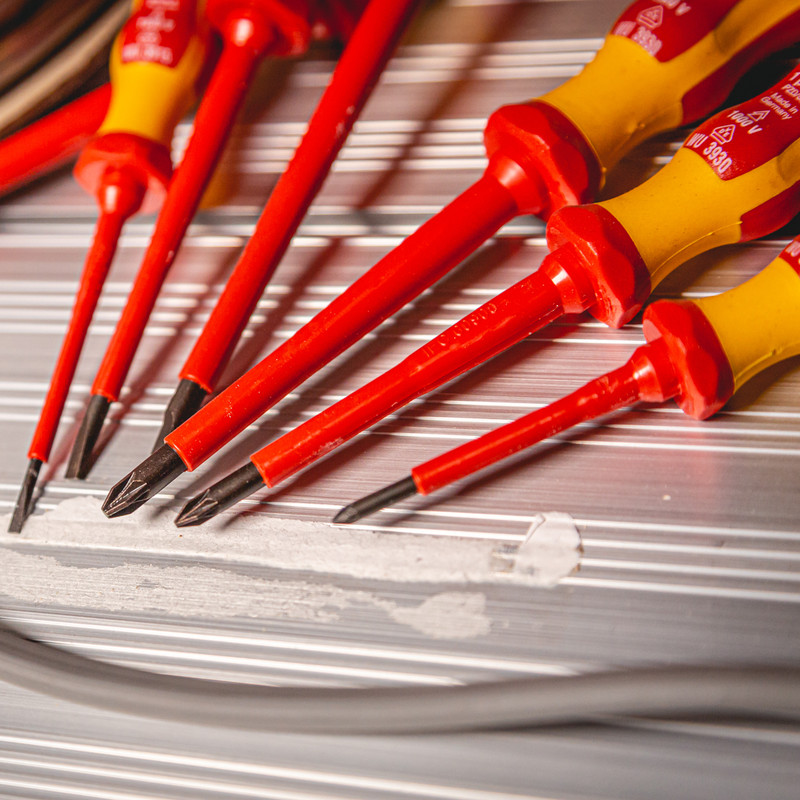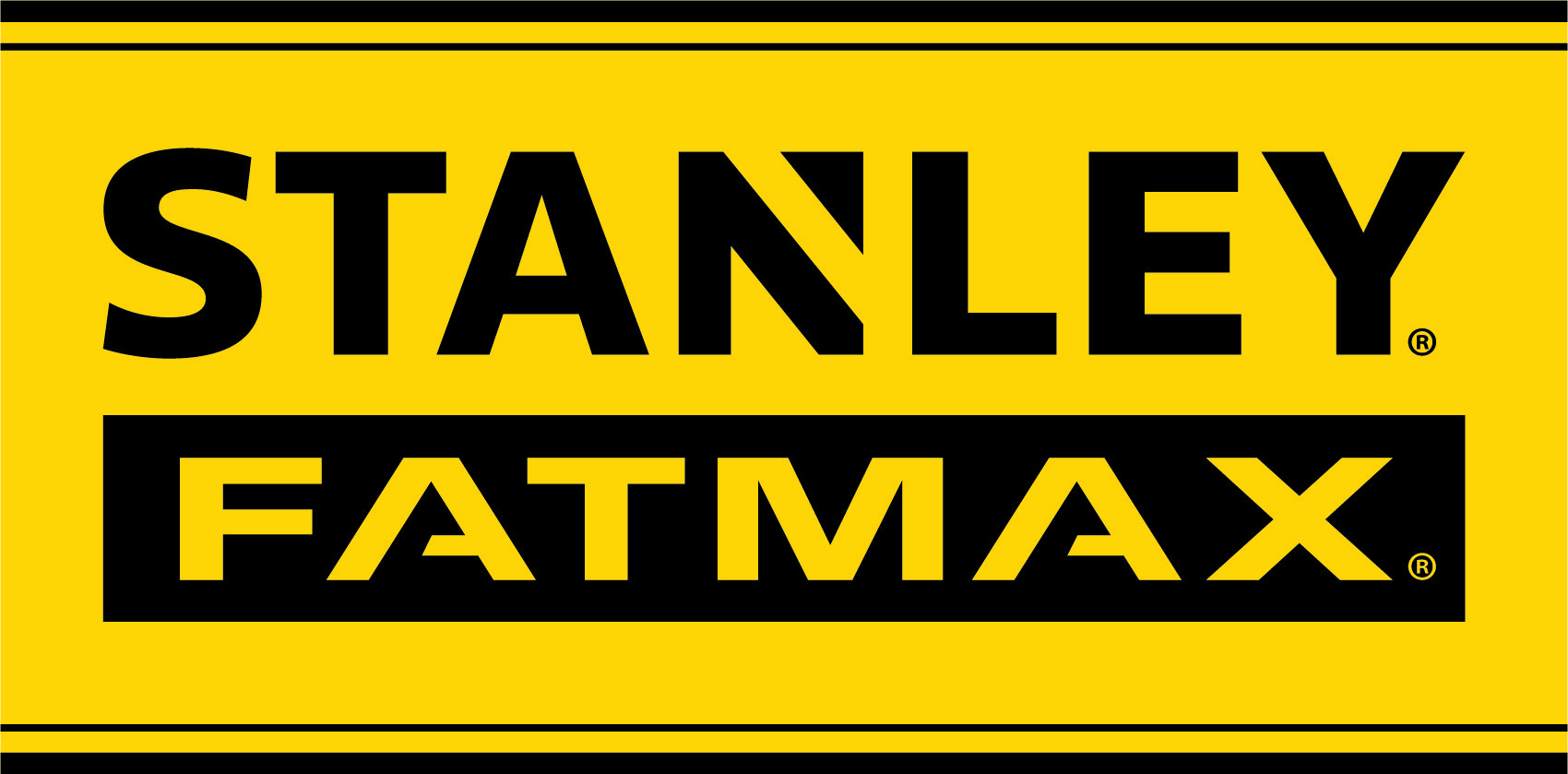Few tools are as universally essential as the trusty screwdriver. From the classic Phillips screwdriver to the star-shaped Torx, every type comes with different features and advantages. All screwdriver types work by slotting into a shaped cavity in the head of a screw with pressure being applied in a clockwise or anticlockwise direction.
Screwdrivers work by using a force called torque. The greater the torque that can be applied by a screwdriver, the tighter a screw will be. However, this isn’t always the desired outcome – too much torque can result in damage to the screw or the screwdriver.
For more info about the types of screw heads available, our screw buying guide offers plenty of help and guidance.
Types of Screwdrivers
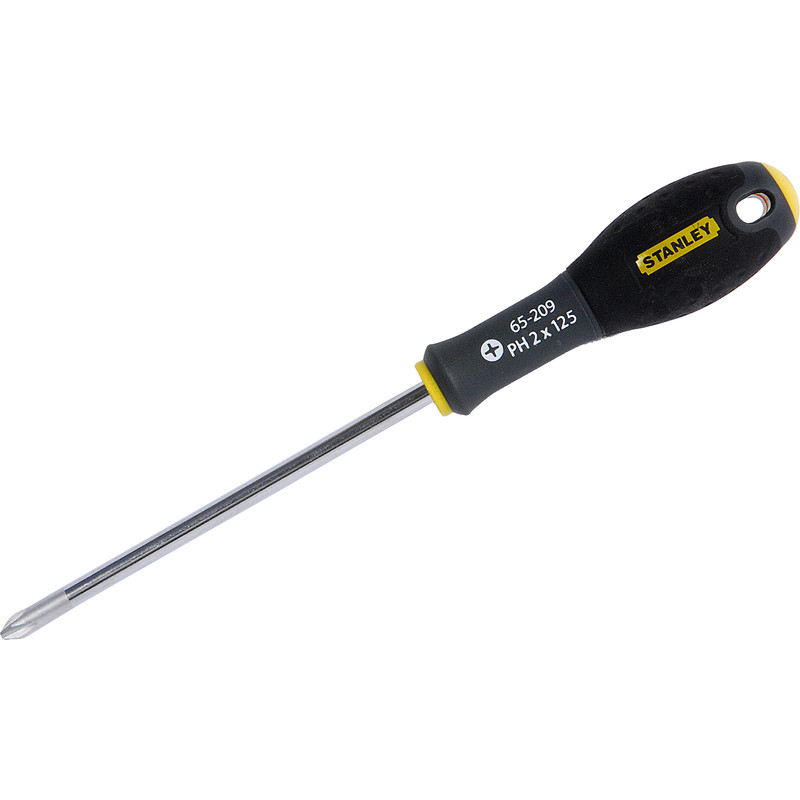
Phillips Screwdrivers
A Phillips screwdriver is designed specifically for Phillips head screws, with a cross-shaped tip that fits into a recess in the screw head. This type of screwdriver is widely used in household items, electronics, and machinery that use Phillips head screws.
The design prevents slipping during use, offering greater precision and alignment. It is particularly useful for applications where a lower risk of cam-out (slipping) is desired. Phillips screwdrivers provide greater torque than flathead screwdrivers.
However, it’s crucial to choose the correct size Phillips screwdriver for the screw to avoid damaging the screw head or the tool itself. Under high torque, there is an increased risk of the screwdriver slipping out of the screw head
Advantages
-
Low risk of slipping out of screw
-
Greater torque than slotted screwdrivers
Things to Consider
-
Correct size screwdriver needed to ensure it works effectively
-
High torque can increase risk of 'cam out'
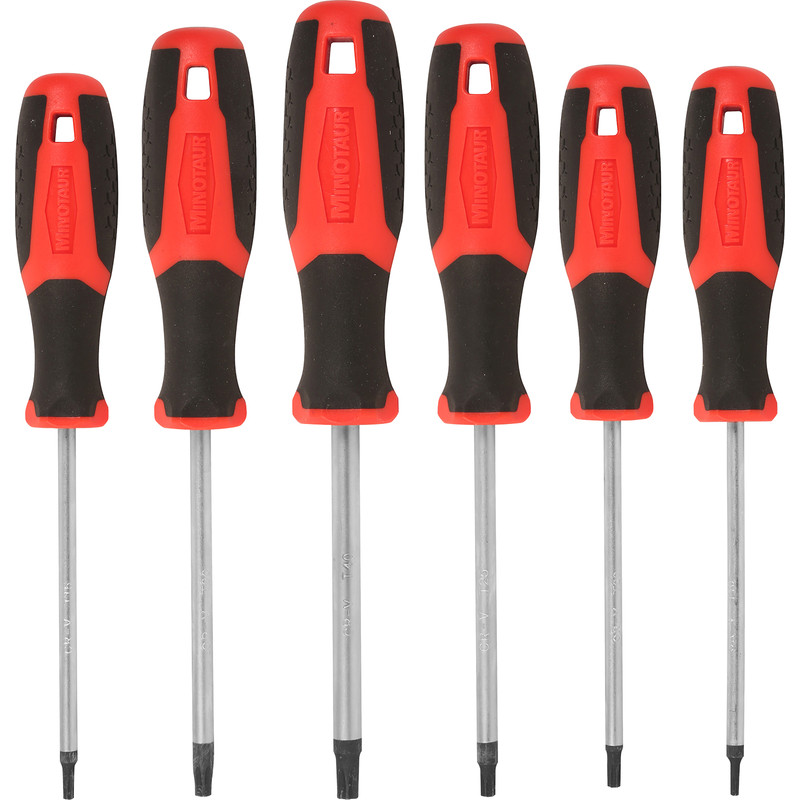
Torx Screwdrivers
A Torx screwdriver is made for Torx screws, which have a distinctive six-pointed star-shaped recess in the screw head. They’re used for applications that need high torque, such as automotive, electronics, and construction industries. The screws come in various sizes denoted by a letter and a number (for example, T5, T20), so you can easily choose the right screwdriver for the screw.
Torx screwdrivers provide a high level of torque. Also, the Torx design minimises the risk of cam-out and slipping during use, enhancing overall stability and reliability – especially compared to classic Phillips and slotted screwdrivers.
Make sure to use the correct size of Torx screwdriver, as the wrong size could cause damage to the screw. Torx screwdrivers and screws are also less widely available than classic screwdriver types.
Advantages
-
High level of torque
-
Minimal risk of driver slipping out during use
Things to Consider
-
Using the wrong size screwdriver could damage the screw
-
Less widely available compared to classic screwdrivers
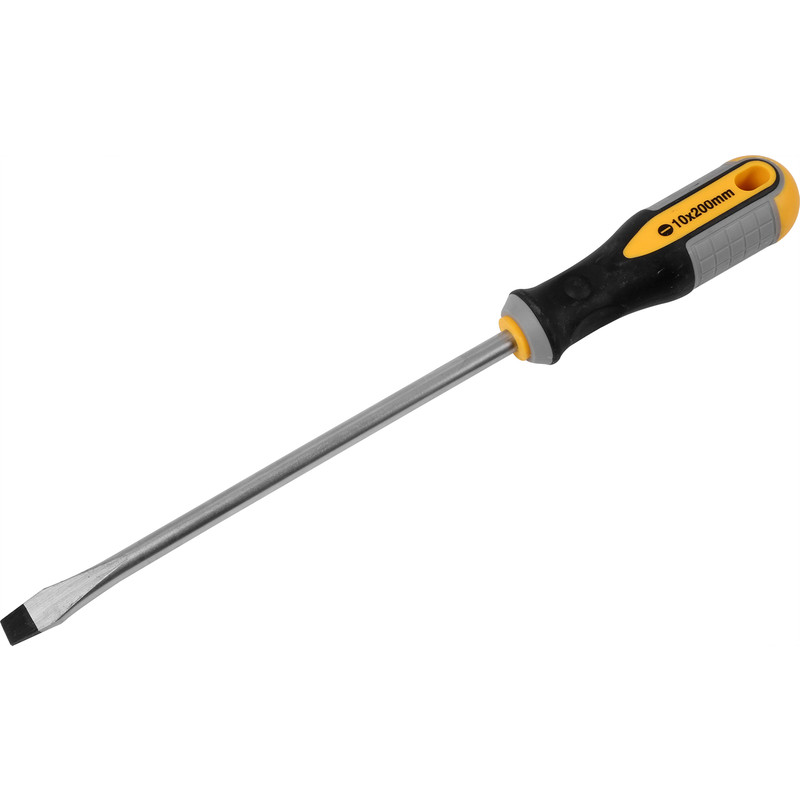
Slotted Screwdrivers
A slotted screwdriver, also known as a flathead screwdriver, is a classic hand tool used for turning screws with a single, flat-bladed tip. This type of screwdriver has a straight, narrow, and flat blade that fits into a groove or slot on the head of a slotted screw. Despite its simplicity, the flathead screwdriver has been widely used for many years and is known for its versatility in a number of situations.
Slotted screwdrivers are suitable for a number of tasks where minimal torque is required, such as in carpentry or attaching faceplates on electrical devices. The design makes it easy to use and it’s also widely available.
Advantages
-
Ideal for tasks that need minimal torque
-
Easy to use
-
Widely available
Things to Consider
-
Could slip out of screw head if used incorrectly
-
Make sure to use the right size driver for the screw to avoid issues
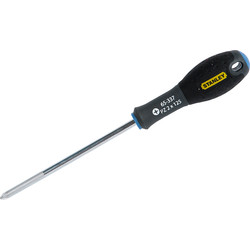
Pozidriv Screwdrivers
A Pozidriv screwdriver is designed for Pozidriv screws, with a cross-shaped tip similar to Phillips screwdrivers, but with small grooves between each of the four main slots. They are an improvement on the Phillips screwdriver as they offer more security when driving the screws in. Pozidriv screwdrivers and screws are commonly used in construction, automotive, and manufacturing – both by DIYers and the trades.
They offer high torque and are not likely to slip out of the screw head. Pozidriv screws are also available in a range of sizes so you’ll always find the right size for the screw you’re driving.
Although Pozidriv screwdrivers are less likely to slip out of the screw head than Phillips screwdrivers, it’s still important to choose the right size driver for the screw to avoid stripping the screw or damaging the surrounding area.
Advantages
-
High torque
-
Unlikely to slip out of screw head
-
Wide range of sizes available
Things to Consider
-
Choose the right size to avoid potential issues
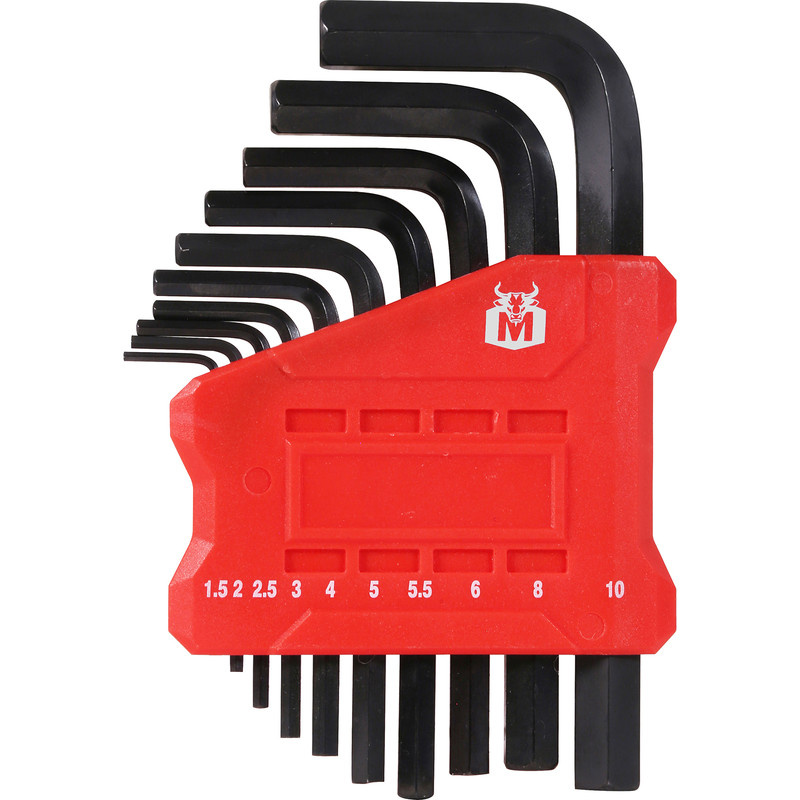
Hex Screwdrivers
Hex screwdrivers, also known as allen wrenches or hex keys, are used to drive and remove screws with a hexagonal socket – also known as a hex screw. Hex screwdrivers come in a number of types, including L-shaped keys and wrenches – the head is hex shaped, but the way they are used differs. L-shaped keys are the most widely recognised, and have one long arm and one short arm which means they can be used in tight spaces if necessary. Hex keys are commonly used to assemble furniture and on bicycles.
The main advantage of hex screwdrivers is that they are very unlikely to slip out of the screw, even when a lot of torque is applied. This means you can achieve a very tight fitting and the screw is very secure.
Some users find that fitting the driver into the screw head is more challenging and fiddly than standard screw head types. You may also find that with excessive torque, such as if using a power tool or over tightening the screw, there is a risk of rounding out the hex socket which would reduce its future effectiveness.
Advantages
-
Secure in the screw
-
High torque can be applied
-
Little change of driver slipping out
Things to Consider
-
Can be fiddly, especially with smaller screws
-
Excessive torque could round out the hex screw head
-
Correct size is essential to prevent damage to screw and driver
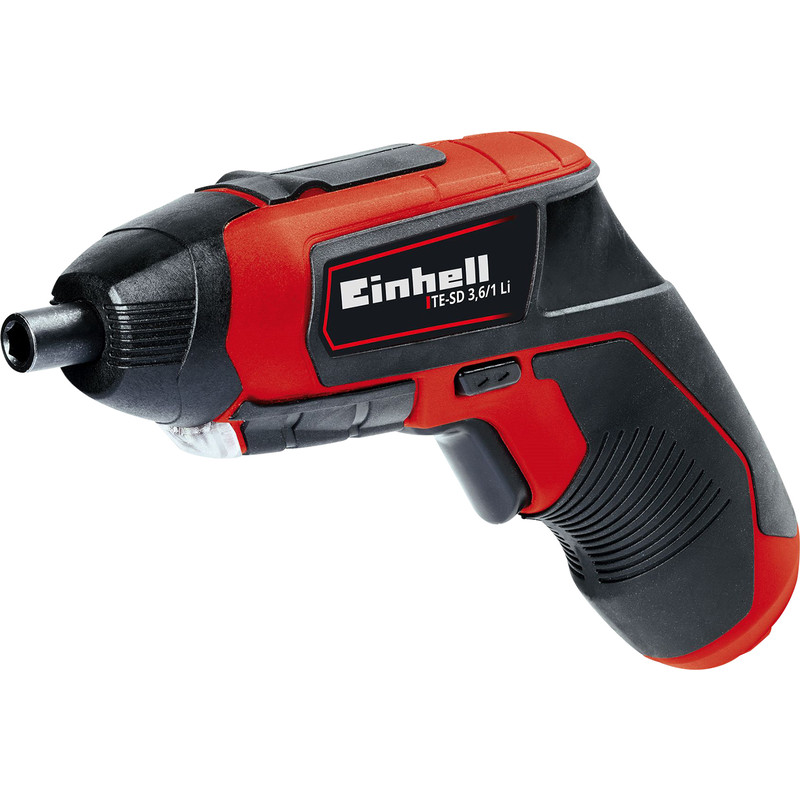
Electric Screwdrivers
An electric screwdriver is a type of screwdriver that uses electricity to drive screws more efficiently and with less effort compared to manual screwdrivers. The majority of electric screwdrivers are cordless, making them ideal for taking from job-to-job and using in awkward spaces. They have interchangeable screw heads so you can drive and remove any screw as long as you have the correct bit. Electric screwdrivers are used in construction, woodworking and various household tasks.
Many electric screwdrivers have built-in LED lights so you can light up the workspace – which is especially useful when driving screws into awkward spaces. They’re versatile for a range of situations thanks to the interchangeable bits and cordless design. You’ll also find they have a switch to change the direction – so you can drive and remove screws easily. Some electric screwdrivers have adjustable torque so you can change the settings depending on the job and prevent over tightening of screws.
Electric screwdrivers are dependent on a power supply and cordless models may run out of charge or battery from time-to-time. It’s a good idea to make sure you charge the screwdriver regularly or have spare batteries on hand so your job isn’t delayed.
Advantages
-
LED lights useful for dark and awkward spaces
-
Versatile
-
Adjustable torque and direction
Things to Consider
-
Requires power supply
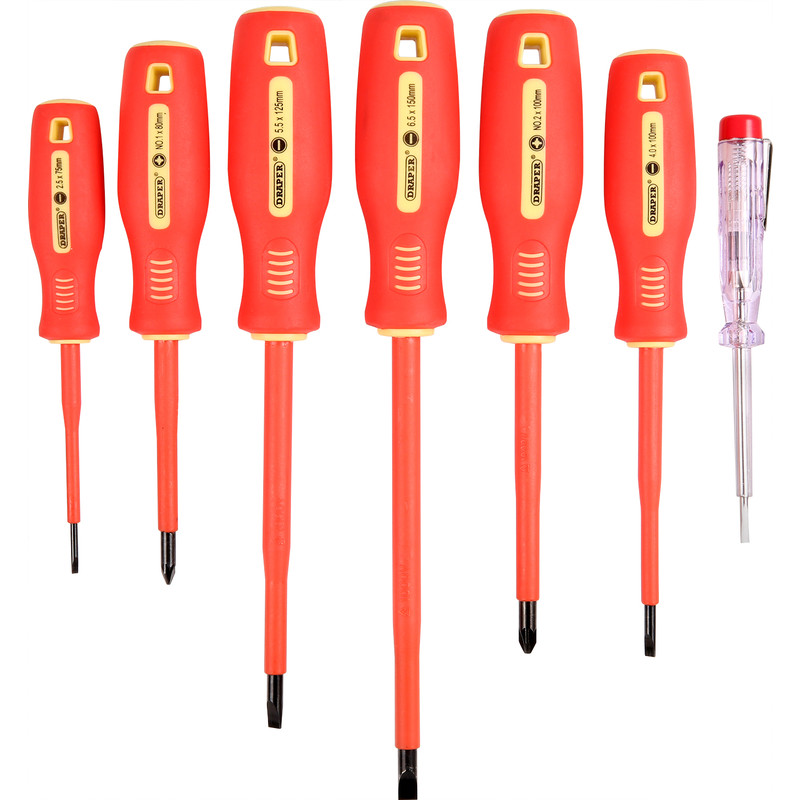
VDE Screwdrivers
VDE screwdrivers are designed for electrical work and insulated for protection against shocks using insulating material which covers the metal shank. All VDE screwdrivers have been tested up to 10,000V making them safe when working on live equipment up to 1000V and our models all comply with 0682/201:2005 01, IEC 60900:2004 and EN60900:2012 safety regulations.
Some manufacturers have a two-colour coating meaning the screwdriver will be red when safe to use, and yellow or orange if it gets damaged. They’re also ergonomic and have a comfortable grip ideal for use during long projects. They come in a variety of sizes and screw head types for any task.
Like all tools, VDE screwdrivers are subject to wear and tear over time. However, as these screwdrivers are designed to be used with electricity, it’s crucial to take extra precautions and make sure they’re safe for use.
Advantages
-
Protect against electric shock
-
Ergonomic design for long projects
-
Wide variety of sizes and types available
Things to Consider
-
Maintenance is especially important to ensure they’re safe
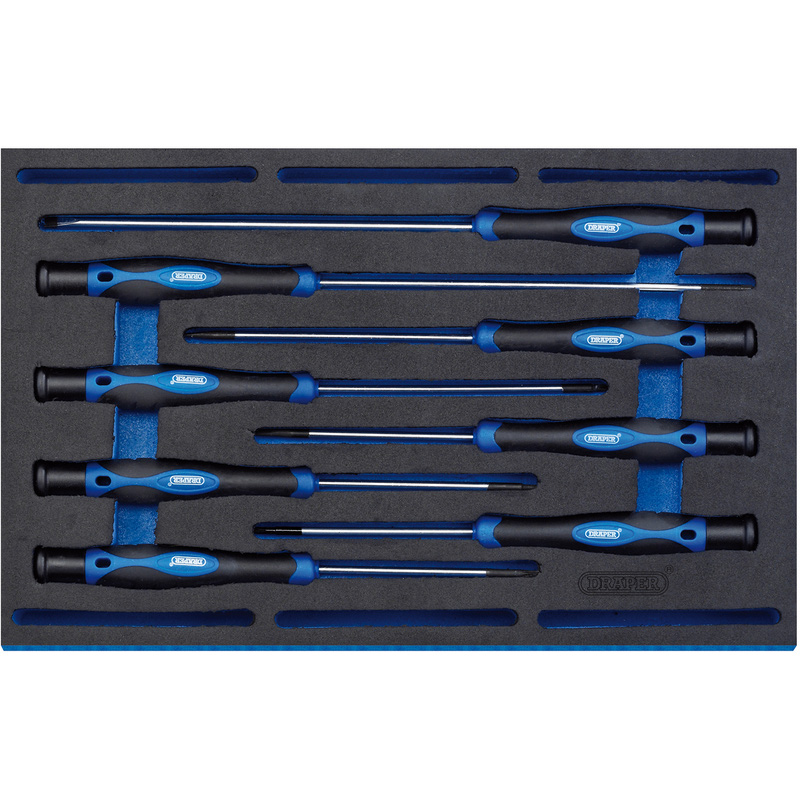
Precision Screwdrivers
Precision screwdrivers are designed for working with small, delicate screws for better accuracy and control. They have very fine tips and are commonly used in intricate work like electronics, watchmaking and jewellery repair.
The main advantage of precision screwdrivers is that they’re designed for specific purposes that other screwdrivers cannot be used for – they’re the best option for tiny, delicate screws. They usually come in sets with different tips for different screw heads, making them very versatile. Also, many models have magnetic tips which reduces the chances of small screws being dropped and lost.
Precision screws have a limited torque due to the small size – although this shouldn’t be an issue for the majority of applications they’re suited for. You may find the tips wear down faster than other screwdriver types, as the tips are much smaller and more delicate.
Advantages
-
Best option for precision work
-
Many have magnetic tips
-
Often sold in sets for different head types
Things to Consider
-
Limited torque due to small size
-
Tips may wear down faster than other screwdrivers
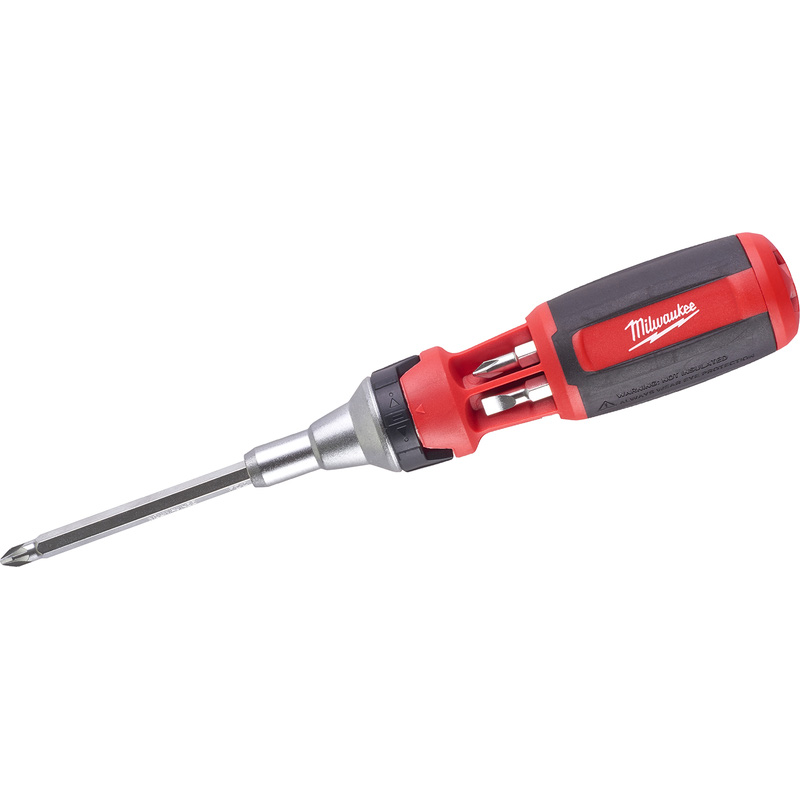
Ratcheting Screwdriver
A ratcheting screwdriver has a mechanism which allows you to continually rotate when driving in bolts and screws without having to reposition. They work using a collar near the handle that prevents the driver from unscrewing the drill bit when turned in the opposite direction. They can also be used to remove screws by adjusting the collar. Ratcheting screwdrivers are used for long jobs that use a number of screws, such as construction, woodworking and automotive industries.
Ratcheting screwdrivers benefit from faster driving and less effort needed to drive and remove screws into surfaces. Some ratcheting drivers have adjustable tension, so you can adjust the resistance of the mechanism. They also often have ergonomic handles which are designed for comfort on long jobs.
A key consideration with ratcheting screwdrivers is that they have a bulkier design compared to alternative types, which means they may not be suited to tight spaces.
Advantages
-
Faster driving at lower effort
-
Adjustable tension
-
Ergonomic handles
Things to Consider
-
Bulkier design than other types
Key Screwdriver Features
Stubby Screwdrivers
Stubby screwdrivers are short-handled tools with compact shafts, designed for use in tight spaces where a regular-sized screwdriver might be difficult. Stubby screwdrivers are commonly used in automotive, electrical, and other applications where access to screws is restricted. They also make an ideal first screwdriver set as they’re versatile for a number of DIY jobs.
Material
Most screwdrivers are made of steel. However, there are a few different types of steel with different properties. For example, Chrome Vanadium Steel contains small amounts of chromium and vanadium to increase its strength, toughness and resistance to wear and tear. Similarly, stainless steel is an alloy known for corrosion resistance even in extreme conditions and is perfect for use outside.
Size
When it comes to size, there are two considerations to make with screwdrivers. Firstly the diameter of the screwdriver tip is given in millimetres and should correspond to the size of the screw. The second consideration should be the length of the screwdriver shank – a longer screwdriver can provide more leverage for difficult screws, but shorter shanks are better for tight spaces.
Sets and Interchangeables
Most of the time, you probably don’t just want one screwdriver – unless it’s for a speciality purpose. Many screwdrivers come as a screwdriver set so you can get multiple sizes of driver in one, giving you flexibility with whatever job comes your way. Another option to help you save space is using a screwdriver with interchangeable screwdriver heads – use just one tool with every screw bit you need.

